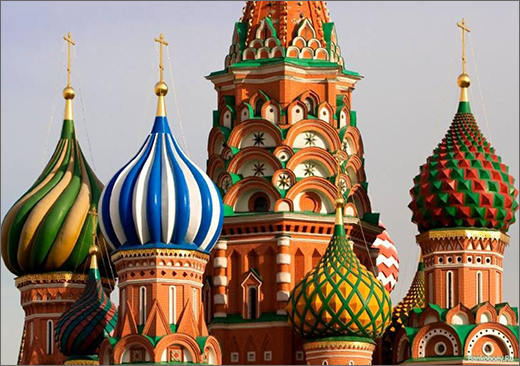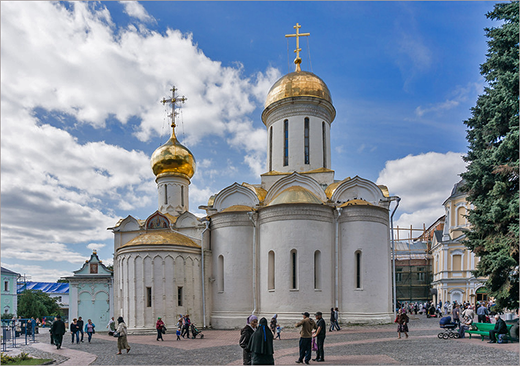Russian language
When travelers come to Russia they all face the same problem. The locals speak the language which doesn't sound familiar and looks odd. This is the reason why many people who normally travel independently feel uneasy on their own.


Russian language on a world map. Source: https://en.wikipedia.org
But you can also learn the alphabet – that will be extremely helpful when you get around Moscow or any other Russian city. Most of the signs are written in Cyrillic alphabet, but if you know at least some of the letters you can often work out what it means.
The Alphabet
We can divide the alphabet into three groups to make it easier to learn
"Friends"
These letters look like English and sound like English
| A a | /ɑː/ | father |
| К к | /k/ | kite |
| O o | /o:/ | port |
| М м | /m/ | mother |
| Т т | /t/ | tent |

Russian word for hot chocolate
The Russian word "КАКАО" is very easy to read. It sounds /kɑːkɑːo:/ and it means
cocoa or hot chocolate drink
"False friends"
These letters look like English but sound different
| В в | /v/ | van |
| Е е | /je/ | yes |
| Н н | /n/ | normal |
| Р р | /r/ | as Scots speak radio |
| С с | /s/ | soft |
| У у | /u:/ | cool |
| Х х | /kh/ | Scottish loch |

Rusian word for a restaurant
Can you guess the meaning of this word? It is not 'pectopah' as you might guess but a Russian word for a restaurant. It sounds /rjesto:ra:n/.
There're many words that sound very similar to English, you only need to remember how 'the false friends' sound.
"The letters which look different"
| Б б | /b/ | book |
| Г г | /g/ | gate |
| Д д | /d/ | door |
| Ё ё | /yo/ | your |
| Ж ж | /zh/ | measure |
| З з | /z/ | zoo |
| И и | /i:/ | feet |
| Й й | /j/ | toy |
| Л л | /l/ | London |
| П п | /p/ | paper |
| Ф ф | /f/ | father |
| Ш ш | /sh/ | shadow |
| Ц ц | /ts/ | fits |
| Щ щ | /shch/ | as in Ckhrushchev (Soviet leader) |
| Ъ | hard sign | |
| Ы ы | /i / | ill |
| Ь | soft sign | |
| Э э | /æ/ | man |
| Ю ю | /yu/ | universe |
| Я я | /ya/ | yard |

Russian words - toilet, McDonalds, Stop, Master Bank
Can you guess the meaning of these words? In fact, they sound very similar to English, so you just need to learn the alphabet. Just in case the words are 'toilet', 'McDonald's', 'stop', and 'master bank'.
The Russian language has a lot of borrowings and you will easily recognize many of the words of English origin.
What languages are spoken in Russia
In Russia, besides Russian, 35 languages are recognized as official in various regions of the country. In addition, there are about 100 languages spoken by ethnic minorities. According to the latest census, 138 million people speak Russian (99.4% of the respondents).
After the Russian, the most common languages in Russia are:

The most widespred languages in Russia after Russian
English words of Russian origin
What English words originated from Russian? Below you may find some of the most well-known Russian wordsvillage life: babushka (granny), matryoshka (Russian nested dolls), banya (Russian sauna), troika ( a sleigh drawn by three horses), samovar (a tea urn which is used to boil the water), balalaika (a musical instrument with three strings)
Soviet history: bolshevik (political party, comes from the word 'majority'), gulag (Soviet system of labor camps and prisons) perestroika (Gorbachev's reforms), glasnost (Gorbachev policy of transparency), Soviet (originally comes from the Russian for "council"), kolhoz (Soviet collective farm)
nature: sable (is a species of marten), taiga (the swampy coniferous forest common in Siberia), mammoth, beluga
space: cosmonaut (Soviet astronaut), sputnik
food: blini, vodka, pelmeni, and names of other popular Russian dishes
Useful everyday vocabulary
| Hello | Здравствуйте | zdrastvuyte |
| Hi | Привет | privet |
| Good bye | До свидания | Do svidanija |
| Thank you | Спасибо | Spasibo |
|
You're welcome |
Пожалуйста*(this word has double meaning) | Pozhaluista |
| Please | Пожалуйста* | Pozhaluista |
| Excuse me | Извините | Izvinite |
| It's fine/good | Хорошо | Kharasho |
| I don't understand | Я не понимаю | Ja nye panimaju |
| How are you? | Как дела? | Kak dela? |
| Where is? | Где? | Gde? |
| How much does it cost? | Сколько стоит? | Skolko stoit? |
You can practice these phrases during your Moscow tour. Even if you try using a few Russian words it'll make the locals very pleased!









